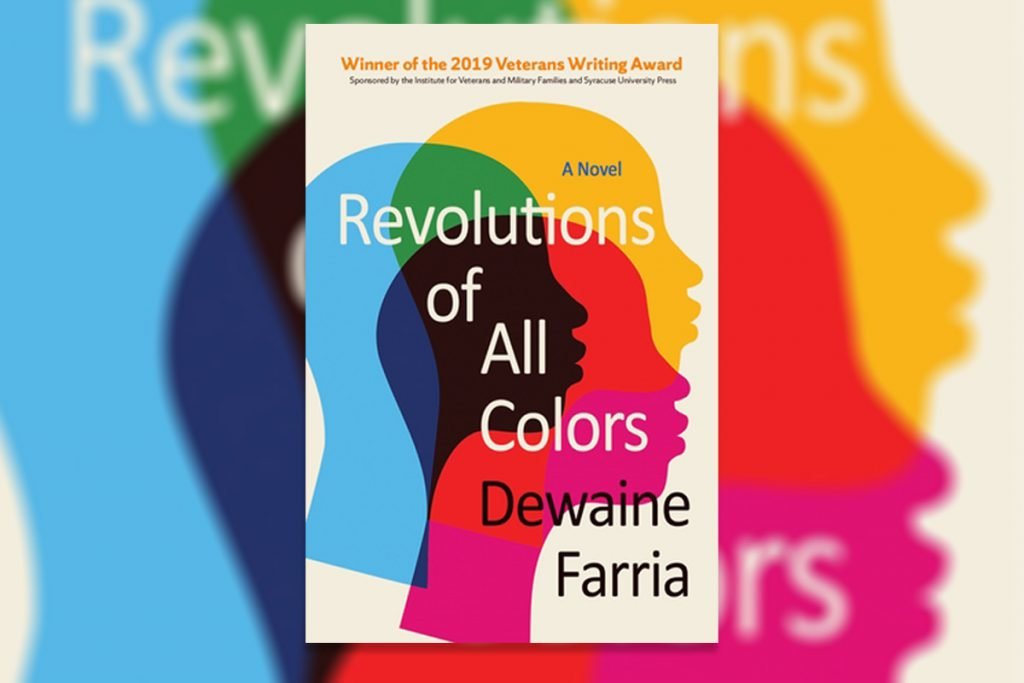Review: ‘Revolutions of All Colors’ Is a Revolution in Fiction
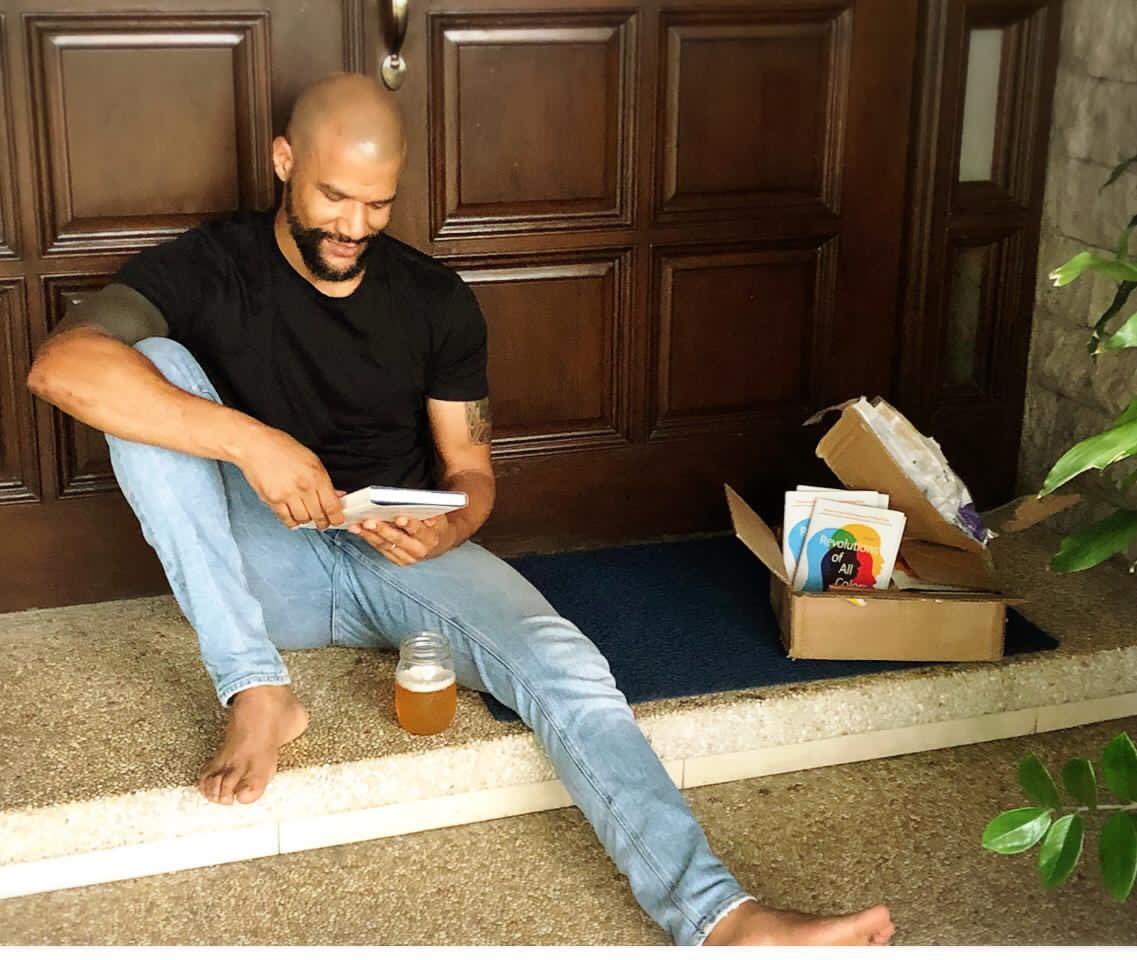
Revolutions of All Colors is Dewaine Farria’s debut novel. Photo courtesy of Dewaine Farria/Twitter.
Be prepared to revel. Revolutions of All Colors: A Novel, a Marine veteran’s first book, is refreshingly unpredictable.
Dewaine Farria’s auspicious literary debut is the audacious choice for the first Veterans Writing Award presented under the auspices of the Institute for Veterans and Military Families and Syracuse University Press.
That’s a mouthful, but your jaw will drop in awe as you read Revolutions, selected for the inaugural award by judge Tobias Wolff — an Army veteran of Vietnam as well as a memoirist (In Pharaoh’s Army, 1994) and novelist (The Barracks Thief, 1984).
Read Farria’s tale of revolutions both personal and societal, and you’ll not be surprised to learn that one of his two master’s degrees is in creative writing. As a writer he’s no slouch:
- A chapter of the novel appears as a short story in the just-published Our Best War Stories from the veteran-inclusive, nonprofit literary journal Line of Advance.
- Farria’s essay about an attack on a United Nations complex where he led security was published in the At War blog of The New York Times in 2018. “Reliving a Deadly Day at a U.N. Compound in Mogadishu” recalls the 2013 experience that “left a permanent scratch on my heart.”
Your heart will at different times be comforted and incensed in Revolutions, which is so good this reviewer read the book twice.
The plot revolves around Vietnam veteran Frank Mathis’ two sons, Gabriel and Michael, and their friend Simon, who is the child of Frank’s coworker and, in effect, his other, surrogate son. But a theme of the book is the perception and the reality of race among characters in Farria’s complex palette of midnight, high yellow, ebony, copper, mocha, and caramel.
The narrative spans more than five decades, starting in 1970 at a True Vine Baptist Church in New Orleans:
“Ettie could no longer ignore the woman with the tambourine.”
In that opening line Farria establishes the character of Ettie Moten — who thinks “it might be easier to go to hell” than to put up with the church duties expected of her deacon father, a Korean War veteran with a Silver Star — and the book’s tone: wit with wisdom.
Ettie, who can be a part of the “colored aristocracy,” finds herself enamored by the “prison-buff Black Panther in shirt sleeves” she spots at True Vine. Troy is a charmer who disarms Ettie, inviting her to meet with sponsors of his community-building effort and “see what it’s like to deal with folks comfortable with us as victims, but not as men.”
Her surreptitious relationship with the Panthers begins. She learns the difference between being “a citizen of a state and a ward of it,” and she hears about the universal plea for equal justice.
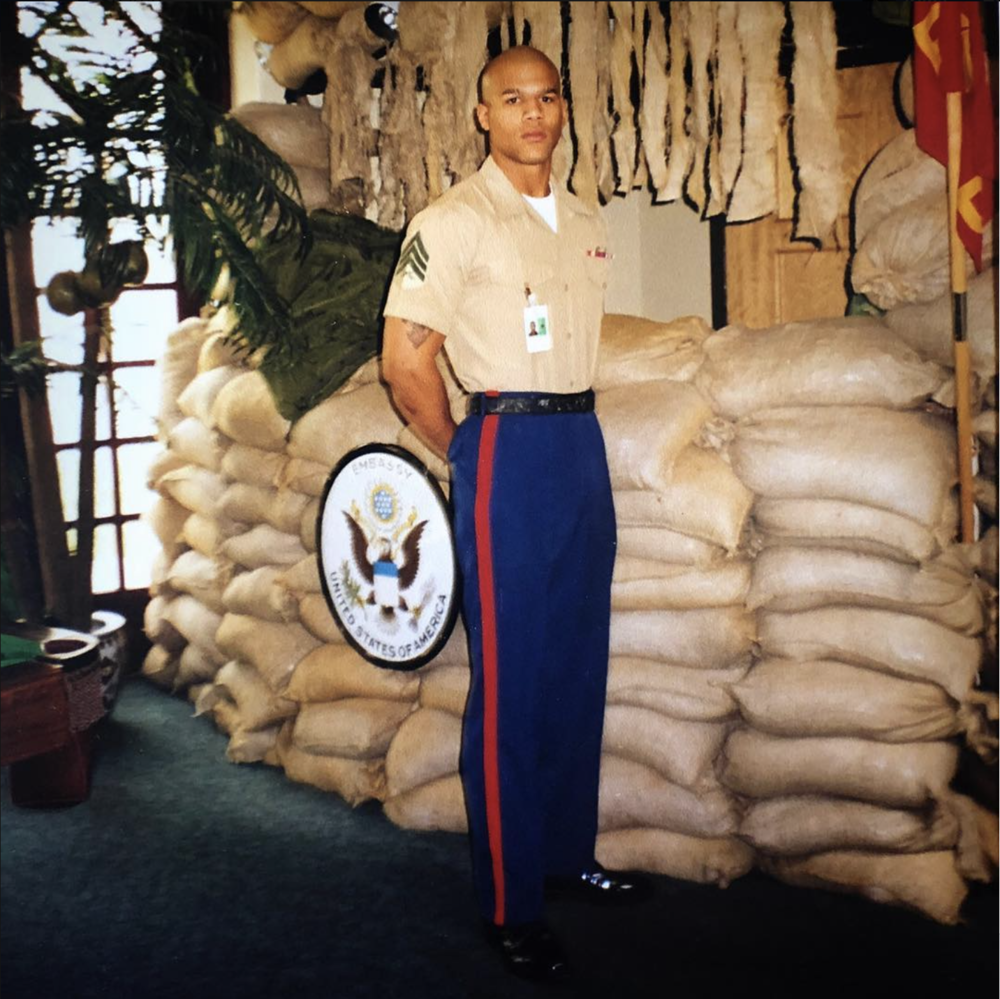
“Our struggle isn’t unique,” Troy tells an audience. “Look at the Brown Berets, the Vietnamese, the Palestinians. Shit, look at Stonewall. This is bigger than just us.”
Nine years later she gives birth to Troy’s child — Simon — the tie that binds in Oklahoma, where Ettie is a counselor and Frank is a deputy warden at Antoine state prison.
“Prison and war encourage ingenuity,” Frank says, and he promotes self-reliance to the three teenage boys — each well-read because of Ettie’s mentoring and tutoring.
Like Frank did, Simon is determined to serve in uniform, and Frank is frank about military service. You hear “no foxhole brotherhood bullshit” from him.
Before Simon enlists in the Air Force — in pararescue, “special forces right outta the gate” — Frank tells about exhilaration during combat that’s “kind of like getting off,” only to be balanced by the dismay of “growing old in an afternoon.”
“In war you learn more about cowardice than courage,” he says. “That and luck.”
After Frank and Ettie inform and stir the plot and the young men set out on their own, Farria switches abruptly from third-person to first-person voice. But when you consider the ever-evolving three protagonists, the switch seems appropriate.
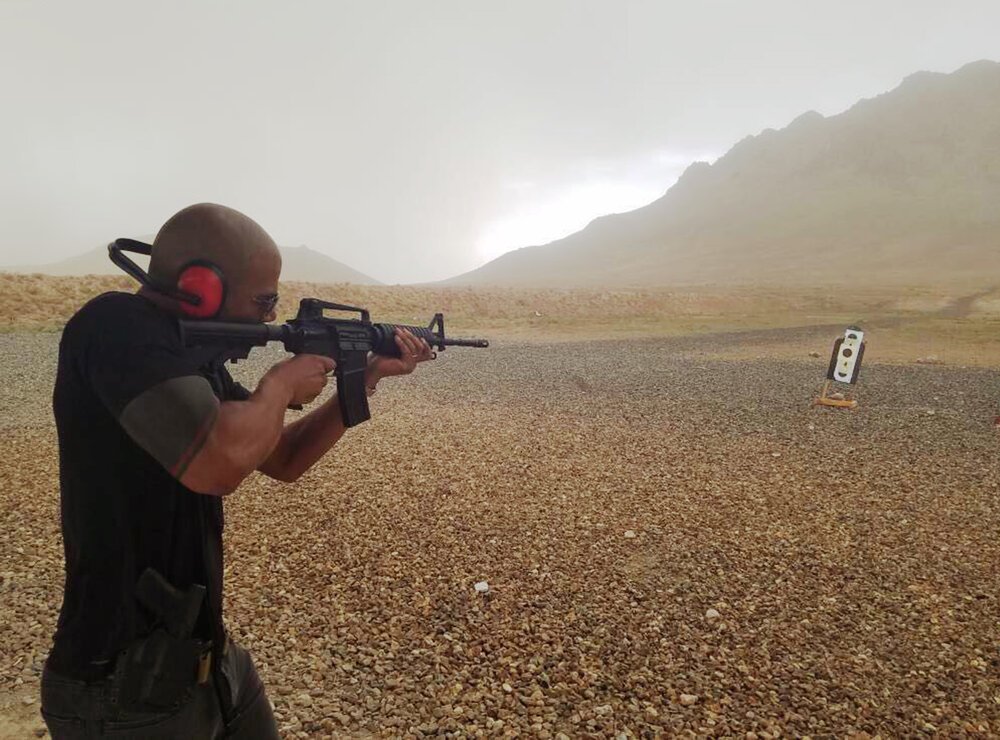
Gabriel is a writer attempting “a novel that refused to get written” and a would-be professional dancer, though he says, “dancing never loved me as much as I loved it.” He has “fallen into a cascade of disappointing my dad’s expectations faster than he could lower them.”
His personal quest takes him to Kyiv, full of “Ukrainian thugs and black romantics,” where he befriends Max, an Israeli army veteran. Max appraises the lackluster start of Gabriel’s book.
“Think of your opening sentence like banging a chick for the first time,” he says. “Until you’ve established yourself, you gotta hit it with everything you’ve got.” Farria himself heeds Max’s words: “Initial sex and first sentences should leave an impression.”
This is handy advice for Gabriel, who falls for Tamara, a trader of arms and ethically questionable products. She reminds him that “on the global stage, all Americans are white,” and she chillingly answers his question about the difference between a serf and a slave.
Michael is often a center of focus but unlike Gabriel and Simon, he never narrates his own chapter. He’s bisexual, the one Simon defends from adolescence, the “faggot-ass” kid whose spasms — caused by a “sacred disease” — inadvertently save him and his brothers during a deadly street fight.
His epileptic disorder oddly disappears at the Oklahoma border, and the prognosis leaves “us as strong and brave as we dared.” Michael is unafraid and is comfortable pulling his badass BFF Simon’s chain. “Sometimes,” he tells veteran Simon, “you sound nostalgic for that good old casual military homophobia.”
Simon is bewildering and beguiling, uninhibited by gender roles of sensuality, and effervescent, “so dark skinned that when he smiled it was like watching the curtains rise on a play.”
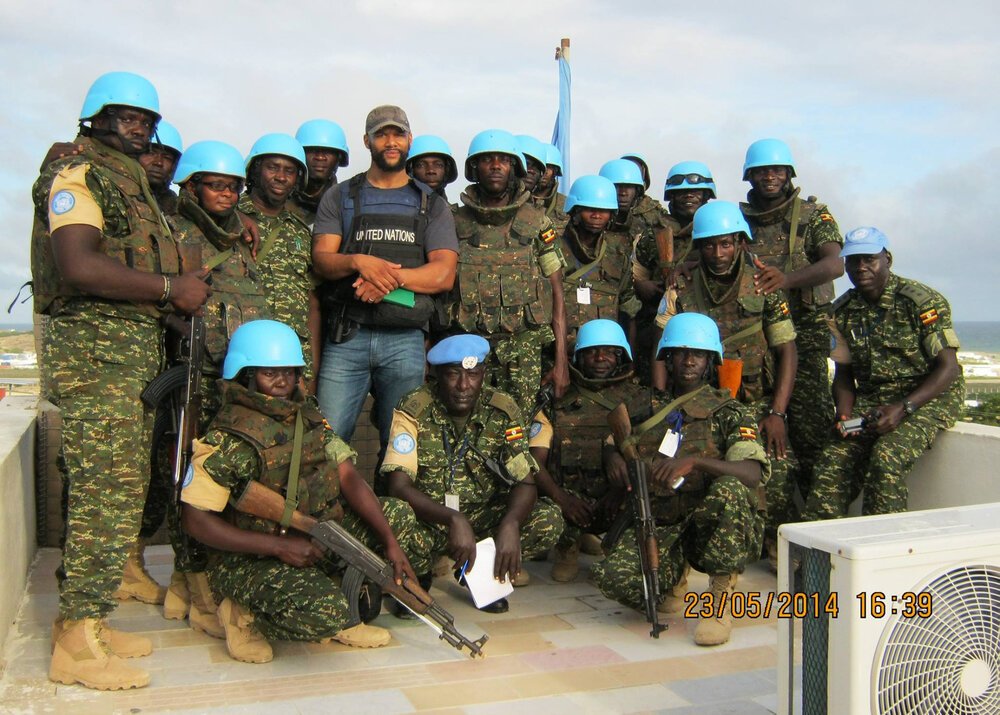
After nearly seven years in special forces, he then enrolls to study international relations, which Gabriel jokes is “the manliest of humanities.” But his purgatory-like term of deployment in Afghanistan prompts him to put his life on hold again. He becomes a contractor in Somalia.
There “you could lose yourself.” There, the Fight God “shrouded you in his little sect, made you difficult for the rest of the world to find. And that’s exactly what you wanted.”
What Simon prefers is constant testing of his stamina, and he ends up on a mat in the exhaustive world of professional mixed martial arts. For the not-so-simple Simon — is he a saint or is he selfish? — the job demands on his brain and body are nothing but mental and physical growing pains.
Ironically, Simon, the love child conceived during political turbulence, “never cared about causes,” he says. “You cared about courage.” However, some readers will decide the eternal warrior — who ignores his own lust child — cares only about himself.
Self-preservation in whatever form is a never-ending obligation for Americans, especially Americans who are not white, who are on the outside perimeter of justice, who want a bit of the American dream.
Frank’s recommendation? Be strong individually. Love thy nation and “try to make it better.” Farria’s slim but stalwart volume of fiction fulfills Frank’s request.
Revolutions of All Colors: A Novel by Dewaine Farria, Syracuse University Press, 208 pages, $23

J. Ford Huffman has reviewed 400-plus books published during the Iraq and Afghanistan war era, mainly for Military Times, and he received the Military Reporters and Editors (MRE) 2018 award for commentary. He co-edited Marine Corps University Press’ The End of Don’t Ask, Don’t Tell (2012). When he is not reading a book or editing words or art, he is usually running, albeit slowly. So far: 48 marathons, including 15 Marine Corps races. Not that he keeps count. Huffman serves on the board of Student Veterans of America and the artist council of Armed Services Arts Partnership and has co-edited two ASAP anthologies. As a content and visual editor, he has advised newsrooms from Defense News to Dubai to Delhi and back.
BRCC and Bad Moon Print Press team up for an exclusive, limited-edition T-shirt design!
BRCC partners with Team Room Design for an exclusive T-shirt release!
Thirty Seconds Out has partnered with BRCC for an exclusive shirt design invoking the God of Winter.
Lucas O'Hara of Grizzly Forge has teamed up with BRCC for a badass, exclusive Shirt Club T-shirt design featuring his most popular knife and tiomahawk.
Coffee or Die sits down with one of the graphic designers behind Black Rifle Coffee's signature look and vibe.
Biden will award the Medal of Honor to a Vietnam War Army helicopter pilot who risked his life to save a reconnaissance team from almost certain death.
Ever wonder how much Jack Mandaville would f*ck sh*t up if he went back in time? The American Revolution didn't even see him coming.
A nearly 200-year-old West Point time capsule that at first appeared to yield little more than dust contains hidden treasure, the US Military Academy said.

